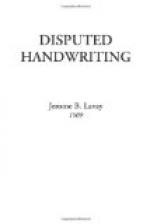There is as yet no physiology of handwriting formulated, and that the further question of the relation of handwriting to the moods of the writer has not ever been touched upon scientifically. The history of science teaches us that in case a fact, which is theoretically and practically important, has been neglected for decades and even centuries by trained scientists; but the subject will now be taken up and a place made for it among the prominent and leading studies of the day. Interest in disputed handwriting and writing of all kinds is rapidly coming to the front in the United States, and is a study and research that the business man of the future will be perfectly familiar with.
It is now no longer the rule to teach to write entirely by the aid of set copies, as was the case with our forefathers, who wrote after one approved pattern, which was copied as nearly as possible from the original set for them; therefore characteristics, peculiarities are longer in asserting themselves and what is now considered a “formal” handwriting was not developed till late in life. There were, and still are, two divisions or classes of handwriting, the professional and personal; with the first the action is mechanical and exhibits few, if any, traces of personality. Yet in the oldest manuscripts studied and consulted there are certain defined characteristics plainly shown. The handwritings of historical and celebrated personages coincide to a remarkable degree with their known virtues and vices, as criticized and detailed by their biographers.
As the art of writing became general, its form varied more, and more, becoming gradually less formal, and each person wrote as was easiest to himself.
Education, as a rule, has a far from beneficial effect upon handwriting; an active brain creates ideas too fast to give the hand time to form the letters clearly, patiently and evenly, the matter, not the material, being to the writer of primary importance.
So as study increased among all classes, writing degenerated from its originally clear, regular lettering into every style of penmanship.
If the subject of handwriting, as a test of personality is carefully studied, it will be found that immediate circumstances greatly influence it; anxiety or great excitement of any kind, illness or any violent emotion, will for the moment greatly affect the writing. Writing depends upon so many things—a firm grasp of the pen, a pliability of the muscles, clearness of vision and brain power—even the writing materials, pens, ink and paper, all make a difference. It is not strange, then, that with so many causes upon which it depends, writing should be an excellent test of personality, temperament and bodily health.
Excitability, hastiness, temperament, personality and impatience are all seen in the handwriting at a glance. A quick brain suggests words and sentences so fast, one upon another, that though the pen races along the page, it cannot write down the ideas quickly enough to satisfy the author.




